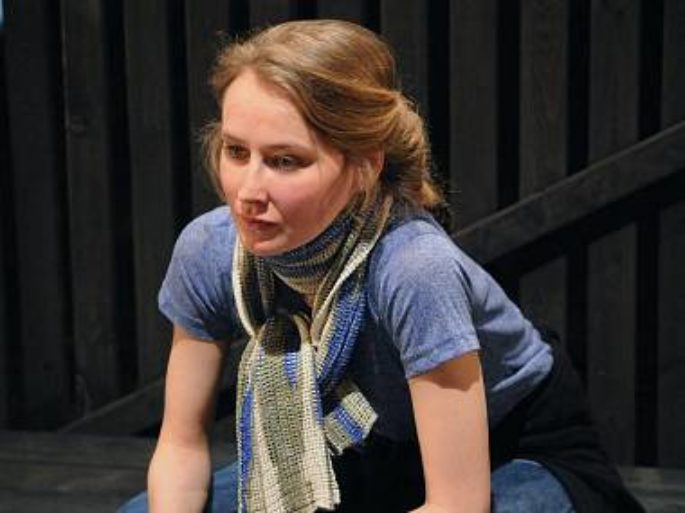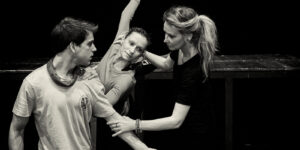The ballet company of the J. K. Tyl Theatre in Pilsen will perform it on the stage of the local Chamber Theatre. Although the play was written in 1891 and has long been a classic, it has inspired young creators who have barely crossed thirty. The music was composed by Petr Wajsar as his feature debut, the libretto and choreography by Alena Pešková, who is also preparing the production as director. She has already appeared on the Pilsen stage, among others, with the ballet The Garden and many times before as an excellent dancer.
You danced beautiful and big roles in Pilsen. Which is your favourite?
Among my favourite Pilsner roles are certainly Marguerite in The Lady with the Camellias, Pamina in The Magic Flute and Lady Macbeth in Macbeth. Now you regularly return to the J. K. Tyl Theatre as a choreographer.
Do you feel like you're coming back or more like you never left?
Of course, I didn't actually leave Pilsen at all. If I remember correctly, there was no season in which I didn't appear here - either as a choreographer or as a dancer. The ballet here has a good background and the company is more than good. You are still at the ideal age for a dancer.
Are you thinking of taking the stage again?
I don't know if I'm the ideal age for a dancer, but if you take the Pilsen ballet star Jiří Žalud as the norm, I'm still just getting around... But seriously: in the summer I had some health problems and I vowed not to get into ballerinas anymore - that means the classical repertoire in any case. If I'm still to work with a choreographer, he needs to be clear about what I can and cannot offer him.
Does that mean you're not performing today?
It is true that I still want to dance and I feel full of energy, I would like to dance in my choreographies, which I sometimes do in smaller pieces, for example at openings or festivals. In Prague, with former Pilsen dancers Zuzana Šimáková and Oleksandr Kysil, I founded the Ultra-minimal-ballet group, which is an experiment and a ridiculous attempt to prove how ballet can be done with minimal resources and in minimal space. The first evening started with just the music of Petr Wajsar and next we will have the opportunity to perform in the reopened Malostranska Slova.
Where did you actually dance after you left the Pilsen Ballet?
My friend David Dvořák, also a former dancer from Pilsen, and I traveled a lot, mostly with Bednárik and Vaculík's Magic Flute. Later I started working with the State Opera in Prague and every January I go to Japan for New Year's concerts with the Vienna orchestra.
At the J. K. Tyl Theatre you staged a poetic and smiling ballet based on Jiří Trnka's The Garden, and now you are preparing a dance Marysha. Are you exclusively interested in new projects that you can give their first ever stage form to?
I can't say that exclusively, but it definitely tempts me more and I feel freer. The music for Zahrada was composed by contemporary Czech composer Zbyněk Matějů, for Marysha by another contemporary composer Petr Wajsar.
Where did you meet and when did you decide to work with him?
I first met Peter at the Blues Cellar, which is a music club run by a friend of mine. That's where I first heard Peter's music. I liked it right away, so I became more interested... And when it came to who should write the music for Marysa, I immediately thought of him. But we didn't really know each other as people, I didn't know if we would understand each other, it was a risk - and it still is until the premiere. Let's hope it works out.
Didn't you think of setting Marysha to the music of E. F. Burian, who composed the opera of the same name?
I thought of it, but I buried the idea pretty quickly. For the dance rendition of Marysha I needed to write the libretto so that everything could be understood without the help of words. So we find ourselves in situations that don't exist in drama or opera. And that would mean using music that was originally written with a completely different idea in mind. I'm not saying that it wouldn't necessarily work, but I wanted a tight fusion of thought, movement and music from the beginning, and that's why I preferred the original music.
What is the music of Petr Wajsar?
Peter's music for Marysha is easy to grasp and read - everyone can sing something from Marysha, but it is far from being - with apologies - stupid and elementary.
Why did you choose a theme from Czech classics for your new production and not a current social issue?
It's nothing programmatic. I've been interested in this topic for a long time and I find Mrštík's play almost brilliant. If something topical appeals to me just as strongly, I won't resist.
From the list of people, it seems that all the major characters from the drama by the Mrštík brothers remain in your ballet. Does your story differ from the original?
I wrote the libretto in such a way that we could be understood without the help of words and at the same time we were not unnecessarily descriptive or fit into unnecessary shifts. So I left out some of the plots, and even the characters, and instead visualised what we can infer from the plot of the drama. The story is no different from the draft, it's just not strictly grounded in a particular time or place.
You present Marysha as dance theatre. How would you describe your choreography?
That's hard to describe. The main thing for me is to know what I want to convey, and then I start moving in a way that feels natural to me, which maybe for some dancers is the height of unnaturalness and they just have to work at it. But when they succeed and it becomes their nature as well, it's impossible not to appreciate it, it becomes a conscious movement that has been thought about in terms of content and form.
What - in your opinion - should Ballet Marysha impress with above all?
I have a very immodest wish. I would like the audience to cry for Marysha, but not just for Marysha, but for all the characters in the play, because there is not one really negative character in this play. All they want is her good. Her father and mother have to be strict, because she doesn't understand how good she is going to be yet... Vávra is really trying to be a good husband and Francek proves that he means his promises. So what happened?! Why do they have to kill? And why do we dare to tell Marysha without words when there is a brilliant drama? Because I think the word is somewhat devalued today, but those "silent" moments are remembered by everyone. They're mostly true. It's much harder to lie without words...
You are the author of the libretto, choreographer and director. However, you are still working on the preparation with the director of the J. K. Tyl Theatre, Jan Burian, who is an experienced drama director. How did he help you?
I submitted the libretto to the director, which I modified according to his comments. For example, following his advice, I emphasized the importance of the company, the chorus, as something we are included in, something that constrains us but at the same time provides a sense of security. This is really important for Marysha. Of course, we also consulted with each other on the choice of music, the set and the costumes.
Do you already know what you want to prepare or dance after Marysha?
This autumn my next dance theatre should premiere in Ústí nad Labem. Its title is Café Aussig and it will be a performance loosely based on the theme of Jean-Claude Penchenat's play "Le Bal" - in our country it is better known for its film version by Ettore Scola "The Dancing Room". The action will take place in an imaginary café in Ústí nad Labem and during the performance a whole century will pass. The performance will be dedicated to the anniversary of the founding of the Ústían theatre. So, after Marysha, I'm going to start on the sound script...
Anyone with the kind of work life you are living now needs the support of loved ones. Who's your support system?
He is, of course, first and foremost my boyfriend, with whom I have been - Jesus Christ, it's going to be eighteen years this year! We've been together since we were kids... The fact that he's also in the industry means that he can help me with my work, so I sometimes "abuse" him. And also my parents have always supported any ideas I have and never said, "..you can't do that, don't even try." I really appreciate that today. And my brother is a sculptor, artist and musician with whom I always have something to say. But I'm sure there are more people like that...




Comments are closed.